Marty Nemko's Blog, page 415
February 25, 2014
Charitable Giving: Principles and Practices of Cost-Effective Philanthropy
 As I get older, I think more and more about the wisest approach to philanthropy, to charitable giving.
As I get older, I think more and more about the wisest approach to philanthropy, to charitable giving.I've settled on two basic criteria:
1. Maximal societal benefit for the dollars expended, including ripple effects.
2. Funding something wouldn't otherwise get funded.
Here are initiatives meeting those criteria that I've funded or considered funding:
A prize
I have written previously about a prize I created. I like a prize rather than a grant because a prize motivates a number of people to work toward the goal I set. In my case, I set up a prize for the best doctoral dissertation leading to understanding the biological basis of cognitive functioning. I like that topic because while having huge potential to benefit humankind, for sociopolitical reasons, it's difficult today to obtain funding for it.
A challenge prize
Since then, I've considered a perhaps more potent corollary approach: offering a prize to the individual or group that first meets a specific challenge So, taking the above example of trying to further our understanding of the biological basis of cognitive function, I've considered, Dr. Richard Haier's suggestion: offering a prize for the first individual or team that is able to predict g (a measure of reasoning ability) based on a brain scan or the person's genome.
Alas, I don't think I can afford to make the prize big enough to motivate a team to redirect its efforts to that issue. I may yet try it with an affordable amount. If no one meets the criterion for winning it, I've lost only the time and administrative cost of publicizing the prize's availability.
Giving to a political candidate or party
I also thought about donating money to a political party or candidate. We are in an era of growing government power, so donating to a party or candidate could significantly affect the country's direction. Again, alas, I don't have enough money to move the needle even slightly.
Funding a meritocratic rather than egalitarian cause
My current favorite idea is to fund an after-school and summer program for high-ability (although not necessarily high-achieving) kids who live in a blue-collar or lower-middle-class area. Here's how that idea meets my criteria:
America has moved heavily from merit-based allocation of resources to an egalitarian "redistributive justice" approach. Hence, in the schools, especially the public elementary schools, considerable fiscal and human resources have been reallocated from programs for bright and gifted students to the lowest achievers. Today's priority is to close the achievement gap.
Yet I believe that ultimately, the greatest societal good will accrue from prioritizing as they say, "the best and brightest." Kids with high cognitive ability (reasoning skills, fast learning ability) are more likely to cure our cancers, govern wisely, indeed develop more effective approaches to closing the achievement gap. Just as a triage medic in the battlefield is trained to allocate the most resources not to the sickest but to those with the greatest potential to survive, I feel that allocating significant resources to high-ability students is wise--We all know brilliant failures, people who fail to live up to their considerable potential.
It's probably not optimal for me to fund programs in a high socioeconomic area: The schools have a high-enough percentage of high-ability kids that even mainstream instruction may not do too bad a job of meeting their needs. And wealthy parents have the wherewithal to supplement.
Nor do I feel it's optimal to donate my dollars to the lowest-income areas. There, the problems faced even by their high-ability kids tend to be sufficiently multidimensional and intractable that I fear my dollars wouldn't make the biggest difference. It strikes me--and I'm relying not on data but only my perhaps flawed logic--that my dollars will likely make the biggest difference by focusing on schools with a high percentage of lower-middle class people, especially those with a good percentage of new immigrants who were at least middle-class in their home country.
I'm thinking that the wisest point of entry is a lower-middle-class school district's after-school and summer program. There, egalitarian pressures may be more moderate, although I'm not sure. I plan to investigate.
Donating time
Of course, one can give charity not just with dollars but with time. I've chose to make writing--for example, this blog--to be my charity of choice. I like writing and like to think that my posts give significant free help to people--maybe even including this post. Another example: Rather than developing and selling my favorite business concepts, I've given them away. For example, last week I tweeted this suggestion; that someone invent Pick Me Up, a robot that would help the aged in and out of bed and pick them up when they fall--a common problem. Of course, Pick Me Up wouldn't replace live caretakers but would help them and/or reduce the number of hours they're needed. Maybe, just maybe, my giving away that idea could help a lot of elders and their caretakers.
You
So now we turn to you. Is there anything in this article that makes you clearer about what you might want to donate your money or time to?
Published on February 25, 2014 19:05
A New Idea for a Great and Easy to Create Summer Camp: Camp Think
 Here's an advance look at my next column in the Mensa publication, The Intelligencer:
Here's an advance look at my next column in the Mensa publication, The Intelligencer:The Life Well-Ledby Marty Nemko
Camp Think
There are camps for sports, arts, science, and religion. Why not a camp that focuses on improving thinking skills, a Camp Think?
It could contain such activities as:
a camp-wide effort to develop a plan to solve a societal problem, for example, substance abuse. The resulting White Paper could be submitted to an appropriate local, state, and federal official. A debate on such issues as: Should taxes be raised? Soda banned? Marijuana legalized? Contests: Which team (and/or individual) can make the robot that wins a 20-year dash? A rocket that flies highest with parts that cost under $50? Develop the best idea for a reinvented elementary school? Win a logic-problem quiz show? Create the best skit? Museum exhibit? Develop the best improvement for next year’s camp? Because life isn’t just about thinking, there would be time for songfests, talent shows, storytelling, and yes, even traditional camp arts and crafts--I still fondly remember learning how to make a lanyard using the diamond and box stitches.None of these require fancy facilities. You could have a small day camp in your home or apartment complex’s community room.
If you’re looking for something to do this summer, you could do much worse than plan a one- or two-week summer day camp for at least a small number of kids.
Published on February 25, 2014 16:34
How to Control Procrastination: A Compilation of My Best Ideas
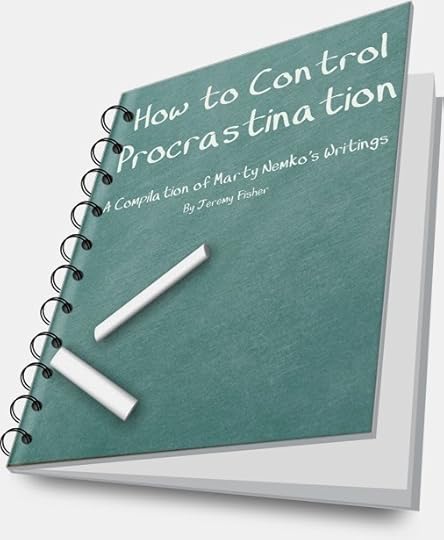
Update: For those of you who tried to click on the link below and it didn't work, I believe it's now fixed. Try it again.
A reader, Jeremy Fisher, flattered me by offering to, for free, convert some of my work into ebooks. He started with my writings on procrastination. HERE it is. It is free.
If enough people click on it to justify the time it would take him to assemble additional ones, he's offered to do that. Thank you so much, Jeremy.
And if you have a suggestion for what topic of my writings you'd like to see distilled into an ebook, feel free to suggest that by commenting below.
Published on February 25, 2014 14:51
February 22, 2014
In Search of Paradox
 I'm reading the book, What Should We Be Worried About?: Real Scenarios that Keep Scientists Up at Night. It consists of 100 top scientists few-page explications of their fears.
I'm reading the book, What Should We Be Worried About?: Real Scenarios that Keep Scientists Up at Night. It consists of 100 top scientists few-page explications of their fears. One of those essays, Amanda Gefter's, made me stop reading to write this blog post. It raised an issue that will forever change the way I think about how to identify and solve problems.
She pointed out that Hendrik Lorentz and Albert Einstein conterminously developed the theory of special relativity yet only Einstein is heralded. Why? Because only Einstein's approach led to an explanation of why that theory is valid. He did that by looking for and then trying to resolve a paradox.
I know next to nothing about particle physics so I turned my attention to trying to find paradoxes in fields I do know something about: human behavior, especially as it pertains to education, career, and health.
Here are four such paradoxes and a proposed resolution for each. If these resolutions stand up to the logical test of time, they may warrant empirical study.
Praise doesn't always motivate more than does criticism
One of educational psychology's core principles is to emphasize praise over criticism. The theory is that praise simultaneously gives feedback and builds self-esteem and thus motivates the recipient to repeat the praised behavior and make further efforts at improvement.
Yet how often have we heard that a person took on a challenge only when told, "You can't do that." I recall, for example, a client who said that only when a high school counselor said, "You're not college material," did he decide to start working hard at school--he wanted to prove that counselor wrong.
A possible resolution of the paradox lies in there being a hierarchy of motivators: Yes, praise is a motivator but being told "You can't" is often stronger. Why? Because it's hard to accept that you're inadequate, a loser. In contrast, praise, while motivating, also engenders complacency. The recipient can't help but relax a bit: "Okay, I'm good enough at least for a while." Perhaps that partly explains why Asians, with a culture that emphasizes self-effacement more than praise, on average have the lowest self-esteem, even though their average achievement is the highest.
Better unemployed than a low-status job
Many unemployed people whose most recent job was white- or skilled blue-collar won't take a job that is "beneath them." Their behavior suggests they'd rather be unemployed than, for example, work as a hotel room cleaner.
Perhaps that derives from their thinking that if they take such a job, they'''ll be permanently stuck at such a job: They'll come home tired from work and lack the energy to look for a better job. Besides, their resume will indicate that their most recent job is hotel room cleaner. That's unlikely to make their resume rise to the top of the stack for a middle-class job. The resistance may also derive from fear of embarrassment--having to tell spouse, family and friends that they've gone from white-or skilled blue-collar to manual labor.
A possible solution might be to first acknowledge to the person that such worries are understandable but that they may be sufficiently mitigatible to justify taking such a job:
1. Let your supervisor and the hotel general manager know you're eager to be promoted and ask what you need to do to make that likely.
2. Leave that low-level employment off your resume for a few weeks. Longer than that gets increasingly dishonest. Use that time pressure to make yourself devote a few hours a week toward finding a higher-level job: Contact everyone in your near and distant network, cold-contact employers that are at least one notch higher-level. For example, if you're a room cleaner at a crappy hotel, drop in on the manager at the Ritz-Carlton and ask for a good job but say you're willing even to be a room cleaner: better to be a room cleaner the Ritz-Carlton than at a flea-bag.
3. Reduce the embarrassment by not telling family and friends about the job or if necessary, explaining only that you've taken an interim job and are working hard to find something better.
Employers often knowingly hire a sub-optimal person
Corporations and nonprofits are ever more focused on cost-cutting: reducing training budgets, expense accounts, anything that doesn't directly build the bottom line. Yet when it comes to hiring, an enormous expense, they often throw cost-effectiveness out the window. The Internet makes it easy to do a worldwide search for the most cost-effective employee. Yet many employers cast a narrow net and worse, end up basing who they hire too much on looks, pleasant personality, etc.
The paradox may derive from the fact that, for many hirers, sexual attraction, the drive to feel superior, and/or be liked trumps their caring about the bottom line. The boss loses nothing by cutting expense account budgets but hiring the most cost-effective employee often means hiring someone less attractive and sycophantic and who is smarter and harder-working than s/he is.
A partial resolution may reside in making hiring decision-makers aware of this tendency. Of course, that won't work with hirers who, even if so aware, care more about personal gratification than the organization's profitability. At least a small percentage of that category of hirers might be helped by asking them the foundational and likely guilt-inducing question: Considering what's good for your career, your coworkers, your organization, and for society, how important is your pleasure versus the organization's products and services being better?"
Heart attack victims quickly return to their bad habits
Ninety percent of coronary bypass patients are, within two years, back to their old fat-, smoke-, and/or stress-filled ways within six months.
Perhaps they're not convinced that retaining the changes will significantly-enough delay another coronary event. Or they believe their life is bad enough that even if reverting to their unhealthy behaviors shortens their life, the pleasures would be worth it.
A possible resolution may be for a counselor to ask the patient about each of the above. It's possible that consciously considering those would make some patients at least moderate their behavior. Perhaps even more potent, a counselor might try to help the patient find reasons to live: the joys of grandparenting, nature, music, work, whatever.
Is there a paradox in your field that you might try to resolve?
Published on February 22, 2014 16:51
February 21, 2014
An Ode to Discipline
Discipline, duty, efficiency, restraint, hard work, soberness. We wave away such words as puritanical anachronisms, out of touch with newer values: finding your passion, sex, drugs, and rock and roll. And the "progress" accelerates:
State-sanctioned lotteries and casinos have burgeoned even though they predominantly hurt the poor, who can least afford to lose. Two-thirds(!) of workers take sick days when not sick. Twelve percent said they took sick days just to watch March Madness! That's so societally accepted that corporations aren't embarrassed to push their recreation product by telling people to take a sick day. For example, the ad below was sponsored by a consortium of Tahoe hotels and casinos, the one below it by the Weather Network.
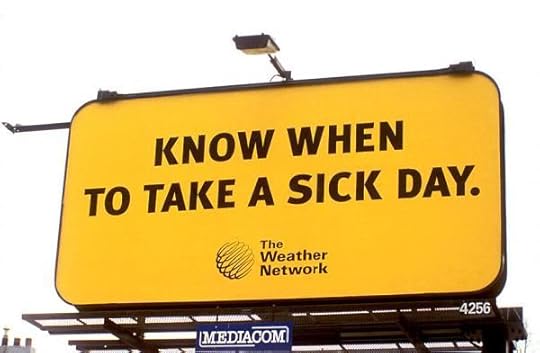
The cheat-if-you-can ethos is yet one more reason why employers hire as few people and automate as many positions as possible. Worst of all has been the increased use of mind- and body-damaging drugs. And now, a majority of Americans favor legalizing pot while almost no one (I'm an exception) advocates banning tobacco or even alcohol. Alcohol has long devastated humankind but adding wide use of pot, coke, heroin, meth, and party drugs I can't even name, has resulted in enormous additional devastation to health, to families, to workplaces. I have written an essay providing a great deal of evidence that legalizing "mere" pot is a nightmare for America. I challenge you to make a stronger counterargument.
We now have a half-century's experience with Stones/Dylan/Beatles/Grateful Dead-inspired libertinism, the permissive society. If we are honest, can we really say our more hedonistic ethos has been a net good? For example, while of course, some young people have an excellent work ethic, millions of others refuse to take anything other than a great job. They'd rather sit on their parents' sofas and watch video games or soap operas and get high. Their parents and especially their grandparents don't begin to understand such a lack of work ethic and neither can I.
The world would be far better if we all accepted that hard, honest work is not an option but a duty, even if the job is far from ideal. The extent to which a person doesn't work hard is the extent to which s/he is a parasite, yes parasite, with hard workers being their hosts. If it's low-level work, so be it.
Anything is better than being a parasite.
Lest you wonder if I practice what I preach, I, for example, for two years worked the night shift as a New York City cab driver and, to this day, at almost 64 years old, work 60 hours a week, at least half for no pay. For example, this is my 1,244th blog post, all carefully written and edited. I just finished editing it at 12:45 AM.
Yet some people would rather suck at the taxpayer's tit for 99 weeks than accept a not-great job. I think little of such people.
As magnificent as is Beethoven's Ode to Joy, I believe at this stage in society's evolution, we might do better to listen to an Ode to Discipline.
State-sanctioned lotteries and casinos have burgeoned even though they predominantly hurt the poor, who can least afford to lose. Two-thirds(!) of workers take sick days when not sick. Twelve percent said they took sick days just to watch March Madness! That's so societally accepted that corporations aren't embarrassed to push their recreation product by telling people to take a sick day. For example, the ad below was sponsored by a consortium of Tahoe hotels and casinos, the one below it by the Weather Network.


The cheat-if-you-can ethos is yet one more reason why employers hire as few people and automate as many positions as possible. Worst of all has been the increased use of mind- and body-damaging drugs. And now, a majority of Americans favor legalizing pot while almost no one (I'm an exception) advocates banning tobacco or even alcohol. Alcohol has long devastated humankind but adding wide use of pot, coke, heroin, meth, and party drugs I can't even name, has resulted in enormous additional devastation to health, to families, to workplaces. I have written an essay providing a great deal of evidence that legalizing "mere" pot is a nightmare for America. I challenge you to make a stronger counterargument.
We now have a half-century's experience with Stones/Dylan/Beatles/Grateful Dead-inspired libertinism, the permissive society. If we are honest, can we really say our more hedonistic ethos has been a net good? For example, while of course, some young people have an excellent work ethic, millions of others refuse to take anything other than a great job. They'd rather sit on their parents' sofas and watch video games or soap operas and get high. Their parents and especially their grandparents don't begin to understand such a lack of work ethic and neither can I.
The world would be far better if we all accepted that hard, honest work is not an option but a duty, even if the job is far from ideal. The extent to which a person doesn't work hard is the extent to which s/he is a parasite, yes parasite, with hard workers being their hosts. If it's low-level work, so be it.
Anything is better than being a parasite.
Lest you wonder if I practice what I preach, I, for example, for two years worked the night shift as a New York City cab driver and, to this day, at almost 64 years old, work 60 hours a week, at least half for no pay. For example, this is my 1,244th blog post, all carefully written and edited. I just finished editing it at 12:45 AM.
Yet some people would rather suck at the taxpayer's tit for 99 weeks than accept a not-great job. I think little of such people.
As magnificent as is Beethoven's Ode to Joy, I believe at this stage in society's evolution, we might do better to listen to an Ode to Discipline.
Published on February 21, 2014 00:18
February 20, 2014
Days of Our Work Lives: Part III: Adam's Saga. Episode 11, the final episode: Do Who You Are

Days of Our Work LivesPart III: Adam's Saga
Episode 11 Do Who You Are
In the previous episode, Adam accepted his first optometrist job, joining the clinical and research team at the VA hospital in Palo Alto, California.
Patient visits being quite structured made it easier for Adam to display the necessary social skills. But even more key to his success, he customized his job to fit him. For example:
Some children's dentists, at the end of an appointment, give the child a small toy. Adam adapted that to his optometry practice. Whether child or adult, at the end of an appointment he asked, "Would you like me to play a song for you on the piano?"
In the years after being Dr. Van Doren's student assistant, Adam learned little more about penetrating eye injuries but having the degree and experience made him perceived as an expert. A show-off from early childhood, Adam thus got himself public speaking opportunities, first at local chapter meetings of the American Optometric Association, then at its national conference.
Adam's talks were more interesting than a typical academic presentation. For example, instead of just flowchart models and diagnostic checklists, his Powerpoint slides included ones like the one on the right.
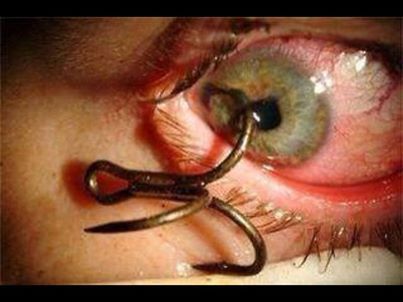 fish hook in eyeball
fish hook in eyeballAnd rather than just citing statistics, Adam told stories, remembering that in his own education, stories made the biggest impression, for example, the Obama Messaging Unit story and the Pope and Mussolini story.
With dozens of optometrists attending each of his training talks, Adam indirectly saved thousands of patients' eyesight.
Adam had his talks video-recorded, then edited to two minutes of nuggets, and uploaded to YouTube. Then he sent the link to lecture bureaus. One chose to represent him and got him dozens of speaking engagements at $10,000 to $15,000 a pop. Sure, he keynoted veteran events but also anti-war festivals, general surgery conventions, even a fisherman's expo.
Adam always gave credit to Dr. Van Doren, and with Harry's permission, pointed out that he had Asperger's Syndrome yet still made an amazing contribution--"Dr. Van Doren is an inspiration to all of us who are trying to succeed despite a serious problem."
To ensure his heart didn't harden as do many successful professionals, rather than taking standard vacations, Adam spent two weeks each year volunteering for Unite for Sight.
And throughout the year, Adam gave a few hours a week to the Lions, a Rotary-like organization that recycles donated eyeglasses to the poor, worldwide. He felt the need to rebel from his mom who continued to be active in Rotary but his rebellion didn't take him further than another service club.
Part III of Days of Our Work Lives: Adam's Saga, ends with Adam in his optometry office, fitting Ben for bifocals and writing a prescription for Susan: "Too young for bifocals." He had finally developed social skills.
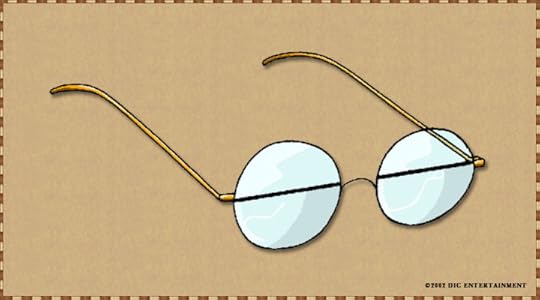
And that concludes Part III of Days of Our Work Lives.
Published on February 20, 2014 15:44
Days of Our Work Lives: Part III: Adam's Saga. Episode 10; Schmooze or Lose?
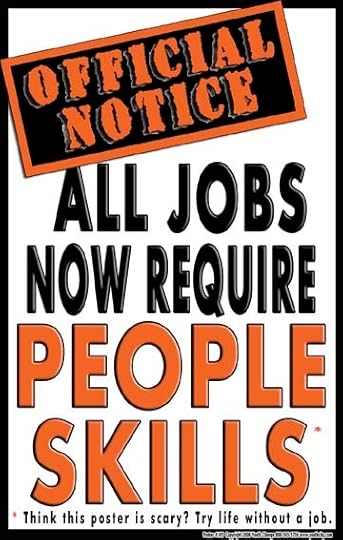 Days of Our Work LivesPart III: Adam's Saga
Days of Our Work LivesPart III: Adam's SagaEpisode 10Schmooze or Lose?
In the previous episode, just before Dr. Van Doren was to give the most important talk of his life, he had a panic attack. He begged Adam to pinch-hit, which Adam did. And the result was two job offers.
Because Adam's talk was on war-caused eye injuries, both offers were from the Veterans Administration. Yet the jobs couldn't have been more different.
One job was as the only optometrist at the VA facility in Clarksburg, West Virginia. As the only optometrist there, he'd get experience with the full range of cases but little support. The other job was to join the team of clinical and research optometrists at the Palo Alto, California VA Center.
While Adam was unofficially offered those jobs on the spot, of course, government requires a long application and review process. He was glad for that because it would give him the opportunity to vet them while they were pretending to vet him.
So Adam peppered the interviews with, "Why did the incumbent leave?" "What's the workplace culture like?" "Every boss is different. Would you tell me a little about you?" and "Would I get a chance to work on penetrating eye injuries?"The interviewers' answers reinforced Adam's preference for the Palo Alto job.
When Adam received the formal job offer from Palo Alto, he asked if he might come in to the workplace to iron out the details. That's a subtle way of letting the employer know he wasn't necessarily going to accept the first offer. Even in government, there's often flexibility in pay. Negotiating in person also gave Adam a chance to see if the workers seem content? Is it a cube farm so loud no one can think?
There, Adam also hung out in the break room and asked employees, 'I've just been offered a job here. What's it really like working here?" Of course, not everyone felt they could be candid, but he got a feel simply by watching their eyes and listening to their tone.
Happily, he accepted the Palo Alto offer. Ironic, Adam had so planned everything to land a job. Because he was laser-focused on being a VA optometrist:
When assigned a paper, he'd often ask the professor if he could substitute a topic related to his career goal. Usually the professor would agree.He made sure his fieldwork and internships were at VA hospitals.He developed a close relationship with a professor who could open VA career doors.Yet, in the end, it was the serendipity of that professor having a panic attack at the right moment that got him his job.
Alas, the deal wasn't quite yet done. Understandably, the offer was contingent on his completing his O.D. degree. Well, six weeks before he was to complete the last requirement, his internship, he received an evaluation: "Technically excellent but deficient in patient-relations." Unless he improved that, he would not graduate.
Adam's lifetime bugaboo would now destroy him far more profoundly than ever. Panicked, he phoned home. Ben, not fully believing what he was to say but needing to offer Adam some realistic hope said, "My social skills improved 100 percent just by reading an old book, How to Win Friends and Influence People, which has sold 15 million copies. The book boils down to: Focus on other people's needs and make them feel good about themselves."
Susan asked, "Isn't that manipulative?"
Ben said, "Consciously or not, we're always manipulating: When I try to convince you to go out for Thai rather than Chinese, when you try to get me to be kinder to you. As long as the goal is ethical, there's nothing wrong with trying to influence people."
Eager to grasp at anything quasi-reasonable, Adam now asked every patient things like, "I'm really here to serve you. How can I be of help?" and "So tell me about yourself." He'd listen intently and pleasantly, and follow-up with, "That's interesting. Tell me more."
That simple approach made enough of a difference.
At graduation, Dr. Van Doren handed out the diplomas. While everyone else just shook his hand, Adam, who is far from a hugger, couldn't resist slamming him with a big bear hug. The audience, especially Ben and Susan, cheered.
Ben whispered to Susan, "Now if he only had a girlfriend."
The next and final episode is HERE.
Published on February 20, 2014 11:42
Days of Our Work Lives: Part III: Adam's Saga. Episode 9: A Good Panic Attack

Days of Our Work LivesPart III: Adam's Saga
Episode 9A Good Panic Attack
In the previous episode, Adam was intrigued by a speaker at the Future Optometrists Club: a professor at the university, Harry Van Doren, who was an expert on penetrating eye injuries...and a person with Asperger's Syndrome.
Intrigued because of his own social awkwardness, Adam went to Van Doren's next office hour.
Adam began by saying that he was fascinated with Van Doren's research. That was all Van Doren needed to go off and running for 15 minutes without a breath, in that mumbly voice, and without making eye contact.
Adam didn't understand half of what Van Doren was saying but didn't want to sound stupid or make him feel like a poor communicator, so when Van Doren came up for air, Adam didn't ask for an re-explanation. He simply said, "Fascinating" whereupon Van Doren finally looked at Adam: "How'd you like to help me?"
Adam, who couldn't even understand Van Doren's introduction to his research said, "How in the world could someone like me be of help to you, Dr. Van Doren?"
"Call me Harry. You can teach me how to be a better presenter. Just the way you've communicated with me here and at the Future Optometrists Club meeting showed me you're a better communicator than I am. I'm so bad that I usually get a panic attack before speaking. And it's getting worse, not better."
"Why don't you get a professional speaking coach or some professor?"
"I'm a little embarrassed to. And actually, I'd feel more comfortable with a student, with you. Adam, I have the biggest speech of my life coming up in three months at the World Council of Optometry International Convention. I need your help."
And for three months, Adam sat with Harry an hour a week, mainly praising, occasionally reminding him to speak up or not mumble. As Adam gained confidence, he dared go a little further: "Do you think you need to add an example here?" or "Do you think there's too much on that slide? Maybe people need it simpler. Or at least I need it simpler."
Instead of getting defensive, Harry said, "Good! I need feedback like that. I'm so close to the research, the most complicated thing seems obvious to me."
At the conference, being with the socially terrible Harry somehow made Adam feel more confident about doing the schmoozey things he knew he should do. For example, he trolled the exhibit area and came a bit early to sessions to initiate conversation with friendly and influential-looking people. His standard opener: "Hi, my name is Adam Sapian. I'm in my final year of optometry school. This is my first conference. How about you?"
Right before Harry was scheduled to speak, he took Adam to an empty conference room, closed the door, and rehearsed the speech one more time. Harry was more nervous. You could feel it. So Adam gave no suggestions. He knew that his job now was just to calm Harry down: "You know more about this than anyone in the world. You'll do great. You're the king!" Harry laughed but his face was pale. Harry looked at his watch and said, "Showtime."
And off they went to the grand ballroom. Harry quivered, "Adam, you sit here, right where you told me I tend to look: a few rows back and just to the right of center. Seeing you a lot will calm me down.
At that moment, the introducer said to the packed ballroom, "Ah, here is the man of the hour. Get up here, Harry!"
Harry shakily climbed the three stairs to the dais. And then, to the audience's surprise, he turned around, raced back to Adam and whispered "I can't do it. I'm having a panic attack. A bad one. Really!"
"Harry, three deep breaths. You can do it."
"I can't. Adam, you do it. You've heard me do it a 1,000 times. Please. You have to!"
And without waiting for an answer, Harry stood up and, now relieved that he wouldn't have to give the talk, said in the loudest voice he ever used:
"It's important that we in the older generation give our young students a chance to shine so I've asked my star student, Adam Sapian to give the talk. He's fully prepared. Please, as you young people say, "Give it up for Adam Sapian!"
And the audience indeed did "give it up for Adam Sapian." Harry's mini-speech had touched everyone.
Adam had no choice. "Okay, Harry, give me your note cards." Adam rose from his seat and, in his ADHD way, ran up the stairs to the dais, and on the last step, tripped and fell onto the dais, whereupon his contact lens popped out."
"God, my contact lens popped out!" And instantly, five eminent optometrists and one clumsy optometry student were all on their knees looking for a contact lens. Adam thought, "Ben was right. I would lose contact lenses."
Fortunately, someone found the lens and, from there, it was remarkably smooth sailing. Adam did a creditable job and whatever insufficiencies were more than compensated by the poignancy of the moment.
Adam ended the talk with, "Of course, I couldn't answer your questions anywhere near as well as Dr. Van Goren can. Dr. Van Goren, do you think you can take questions?" And Harry did, more poised than he had ever been in his life.
Afterwards, Adam had a longer line of people waiting to talk with him than did Harry. One was the vice-president of the American Optometric Association who asked if he'd be the student member of speaker selection committee. And two others made him an even better offer: a job!
But which to pick?
I hope to post the next episode this morning.
Published on February 20, 2014 00:05
February 19, 2014
Days of Our Work Lives: Part III: Adam's Saga. Episode 8: The Benefits of Membership
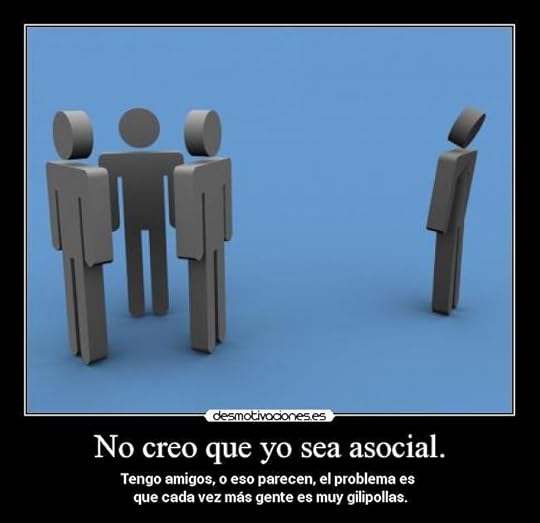
Days of Our Work LivesPart III: Adam's Saga
Episode 8The Benefits of Membership
In the previous episode, Adam went off to college, having broken up a perfect relationship. His intuition was that he was meant to devote himself single-mindedly to career.
When he arrived at college and saw everyone hooking up, platonically and otherwise, part of him felt should join in. But most of him wanted to resist his parents' and society's urgings to be more social.
On the other hand, he was aware his lack of social skills had already hurt him. Although he was the better musician, a more social person was chosen to be the Skit! musical director. Although his platform was far wiser, a more social person with a silly platform was elected treasurer.
He decided he needed to make friends and thought the easiest way would be to get built-in ones. So he rushed six fraternities--and was rejected by all six.
He figured maybe that was another sign he should just throw himself into his schoolwork. He did so and did fine except, ironically, in science courses, where he struggled just to get B's. That resurrected his old self-doubts that came from his having gotten a D in Algebra I in the 8th grade.
That also tempted him to find an easier major than biology, which as Ben had told him, wasn't about fuzzy animals. It mainly was math, hard math. And those mathy science courses were made especially hard because they were often taught by foreign professors who spoke poor English and somehow assumed his students were natural whizzes like him.
Adam was additionally tempted to change majors when he took a history course. He found it far more fascinating than stochastic processes or topological algebra. He loved stories like the one about Pope Pius XI who, failing, had taken to bed. But he wanted to make one last speech--denouncing Mussolini's aligning with Hitler, but in case he was too weak to, he ordered 350 copies printed. Indeed, he died before he could make the speech. Mussolini, afraid the printed speech would get distributed, went to a cardinal he knew in the Vatican who had been a close friend of the Pope and convinced him to burn the 350 copies. When the next Pope was named, the one selected was none other than that cardinal. And in a feeble attempt to hide his betrayal of his friend, the cardinal took his name: Pope Pius XII.
 That was a lesson Adam wanted to never forget: Question authority, no matter how high the office.
That was a lesson Adam wanted to never forget: Question authority, no matter how high the office.Before deciding to change majors, he figured he'd go to one meeting of the Future Optometrist Club to see what they thought. And lo, there he found some kindred spirits. Sure, some were socially savvy but more were awkward like him. And when he asked the guest speaker, the head of a large optometry practice, if Adam's having struggled in the science courses meant he'd be a bad optometrist, the speaker laughed and said, "Sometimes it's the opposite: the worst students academically can often be the best with patients." Adam decided to not change majors.
In a subsequent Future Optometrist Club meeting, the guest speaker was one of the professors, Dr. Harry Van Doren. He was introduced as one of the world's leading experts on penetrating eye injuries
 --an injury common in war. Van Doren may have been an expert on eye injuries but he made no eye contact with his audience, and his voice was unclear and barely audible. When Adam whispered to another student, "What's with him?" He replied, "He has Asperger's, on the autistic spectrum. He's brilliant and kind but can't communicate worth shit."
--an injury common in war. Van Doren may have been an expert on eye injuries but he made no eye contact with his audience, and his voice was unclear and barely audible. When Adam whispered to another student, "What's with him?" He replied, "He has Asperger's, on the autistic spectrum. He's brilliant and kind but can't communicate worth shit."And that made Adam stay after his talk to ask him a few questions and decide to visit him during his next office hour.
The next episode is HERE.
Published on February 19, 2014 21:37
Days of Our Work Lives: Part III: Adam's Saga. Episode 7: Love Versus Career.
 Days of Our Work Lives
Days of Our Work LivesPart III: Adam's Saga
Episode 7 Love Versus Career
In the previous episode, Adam ran for student government treasurer and lost.
Now a senior, he needed an extracurricular, if only to buff up his college applications--He really wanted to get into one of those seven-year combined bachelor's/Doctor of Optometry programs.
So he applied to be music director for Skit!, a competition of musical skits among the senior, junior, and sophomore classes. After all, he had learned to play piano well by ear. While still in 4th grade he played the Star Spangled Banner at an assembly. (When he finished, show-off that he was, he asked the teacher, "Can I play an encore," whereupon the teacher escorted him back to his seat.) And last year, a sax-playing student asked if Adam wanted to make $25 playing a New Year's Eve gig at an Air Force base. Adam of course said yes. Alas, the sax player didn't tell him it was 100 miles away and that they'd have to rent a car to get there.
Skit's! student director chose someone else to be the music director--a worse musician than Adam but a more popular kid. Again, Adam got the message that it may be better to be popular than good.
But that turned out for the best. Skit's student director asked Adam if he'd be the audio-visual person. Adam liked gadgets and precision and besides, it was an extracurricular to put on his college applications. In his application essay, he could explain how the skills he developed doing A/V could be relevant to being an optometrist. So he agreed.
Being the A/V guy yielded an even bigger benefit: He met Sara. She was the first girl who ever flirted with him: She looked him in the eye rather than past him. She even initiated conversation with him. In fact, she asked if he needed any help with the audio-visual. He didn't but he said he did.
One day when he was setting up equipment in the sound booth, one of his contact lenses fell out. He and Sara got down on their knees to look for it. And when she found it, she said, "Can I put it in your eye?" Slowly, steadily, she did. And then she kissed him. His first real kiss.
In April, Adam got two fat envelopes. He had been admitted to two 7 yr OD/BS programs! He was smart about how he picked one: He read the student reviews in The Princeton Review Guide and on College Confidential, and when he visited the colleges, he asked random students what they liked and didn't like about the college. He gave little weight to the tour, knowing that would be like buying a car based on the salesperson. Nor did he give much weight to the campus's physical attractiveness. He knew that after the first few months, he'd hardly notice it. He also sat in on an advanced optometry class and at the break, asked students what they thought of the program and how employable the graduates are. As a result, he preferred the State University of New York program. Not only did the program seem great, it was exciting to think about living in New York City!
But at graduation, Adam and Sara had a difficult conversation. Should he not go there and go to the University of Washington where she was going? Should they go to separate colleges but agree to stay faithful to each other? Although Sara was a wonderful person, their relationship was great, and Sara wanted to continue the relationship, Adam was clear they shouldn't.
Indeed, Adam ended up introducing Sara to her future husband. That presented an important career clue: Adam, in his heart, knew he would be wisest to resist societal pressures and remain single forever so he could devote himself more fully to work.
That decision would profoundly affect his life...and that of many others.
The next episode is HERE.
Published on February 19, 2014 16:34
Marty Nemko's Blog
- Marty Nemko's profile
- 4 followers
Marty Nemko isn't a Goodreads Author
(yet),
but they
do have a blog,
so here are some recent posts imported from
their feed.



